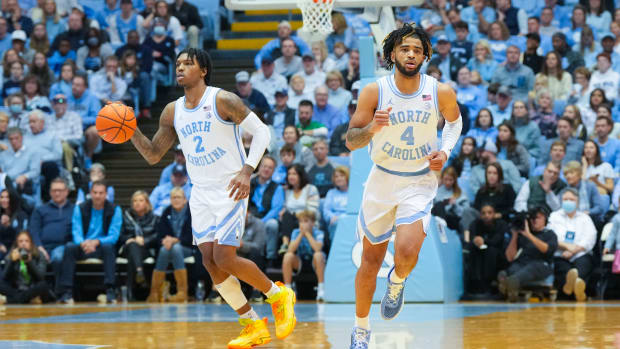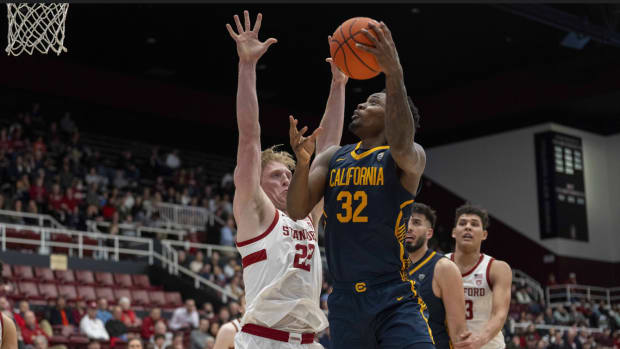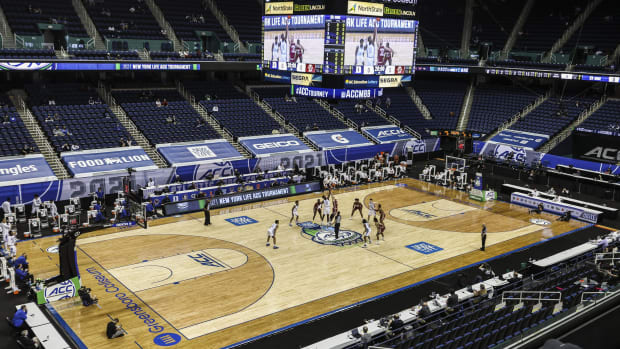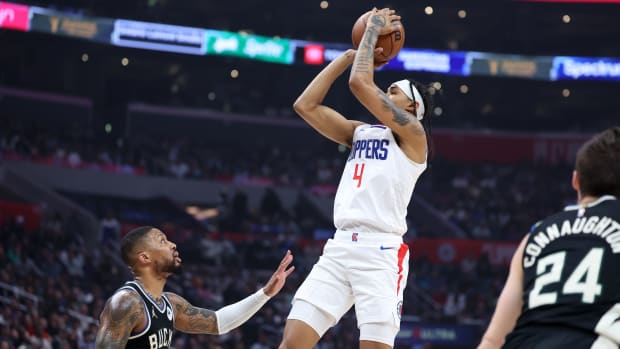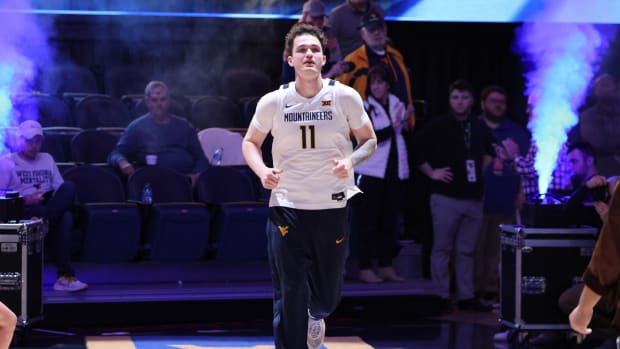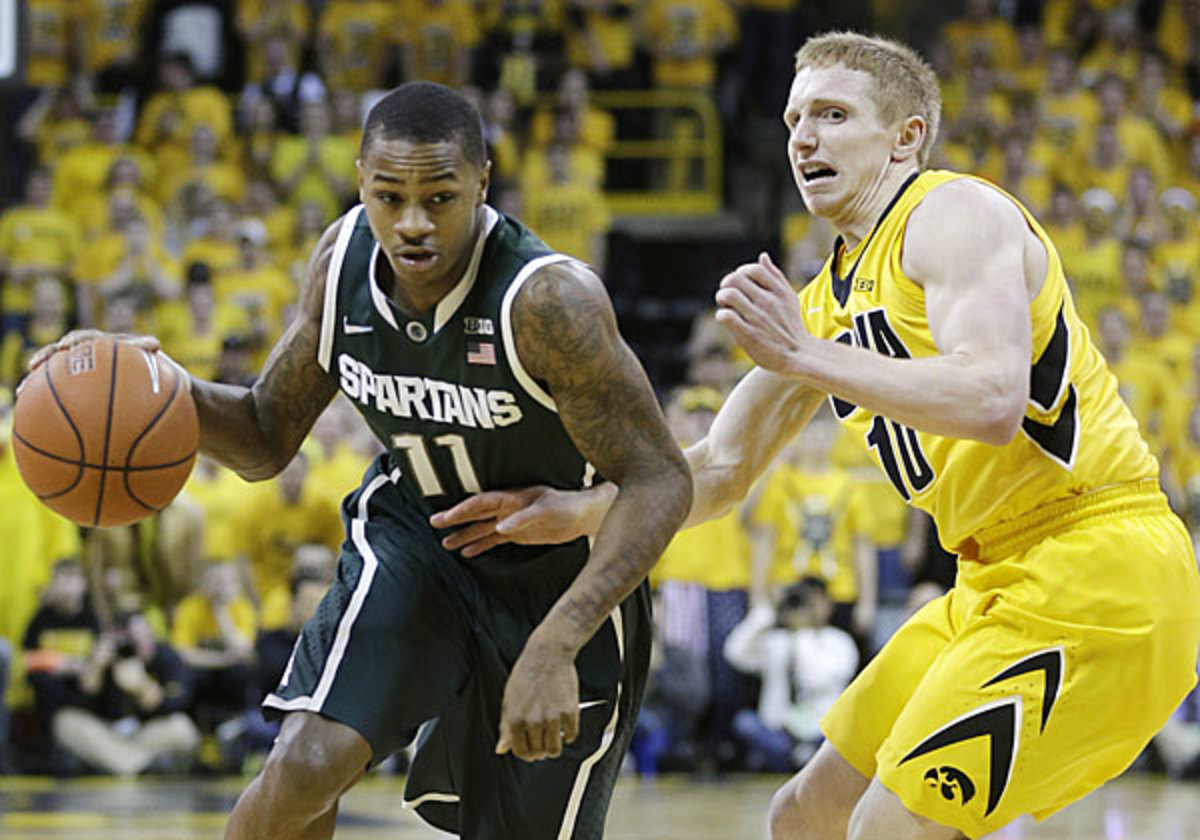
Defense, grit lead Spartans past Hawkeyes in OT, Kentucky falls, more
Despite playing with a variety of aches and pains, Keith Appling scored 16 in Michigan State's OT win over Iowa. (Charlie Neibergall/AP)
No. 7 Michigan State 71, No. 15 Iowa 69 (OT): In a matchup where both teams endured lengthy stretches without a field goal, there was something fitting about how the game's decisive shot came from a player -- Russell Byrd, a junior backup for the Spartans -- who himself makes them so rarely. Byrd had made just one field goal since Dec. 17 (and been kept on the bench for five of Michigan State's last eight games) before Tuesday night, but there he was in the left corner, receiving a Denzel Valentine pass with 33 seconds left in overtime that he converted for a three-pointer that ultimately provided the difference in yet another impressive, grinding win in a Spartans season that's been filled with them.
"What a fistfight," Jay Bilas had remarked on the telecast as regulation ended in Iowa City, and he was right. This was well short of an offensive showcase: Before Roy Devyn Marble's lay-up in the game's final six seconds, the Hawkeyes had gone nearly 15 minutes without hitting a shot from the floor, while the Spartans endured two of their own such droughts that lasted five-plus minutes. But this game was really the story of two of the nation's stronger defenses -- both entered the night in the top 20 in defensive efficiency -- denying their opponent its offense. Iowa, in particular, sent Michigan State for loops by applying pressure for three-quarters of the court and mixing in traps, forcing the Spartans into long possessions and forced jumpers in the shot clock's final moments.
On the other end, Michigan State's defensive aggressiveness got it into trouble, particularly in the first half, by sending the Hawkeyes to the charity stripe on their frequent drives to the rim. Combined with the Spartans' struggles to get the ball inside and do the same, the effect was a marked free-throw advantage for the hosts, who attempted 43 compared to Michigan State's 20, though by making 30 and 11 of such shots, respectively, neither team took much advantage of their trips. The difference came from the field, and especially beyond the arc, where the Hawkeyes made just three of 12 shots in the game and the Spartans made six of their 16 attempts after halftime, culminating with Byrd's.
Michigan State coach Tom Izzo had said after Saturday's loss to Michigan -- the Spartans' first Big Ten defeat -- that he had never been more proud of a team in his 30 years in East Lansing, and Tuesday's win was as good an example as any of why. The Spartans were again shorthanded, as has become the norm this season: starting big man Adreian Payne (foot sprain) missed his sixth straight game, fellow first-team forward Branden Dawson (broken hand) continued what's expected to be a four-to-five-week absence, and starting point guard Keith Appling, who is also nursing a sore shoulder and hip pointer, was enduring such pain in his right (shooting) wrist that he told ESPN sideline reporter Allison Williams to ease up on their handshake before the game. With first-half foul trouble forcing him to go even deeper into his bench, Izzo told Williams at halftime, "I've got some weird guys out there right now."
Sure, there were hiccups on Tuesday -- most notably Appling missing a pair of three throws with the chance to seal the game with 4.4 seconds left in overtime -- but Izzo's undermanned Spartans withstood every blow from a Hawkeyes team ranked fourth nationally in Ken Pomeroy's efficiency-based rankings and in the top 15 of both major polls. Valentine shrugged off early struggles to aggressively provide several key buckets; guard Gary Harris blocked Iowa forward Melsahn Basabe from behind at the rim in the final minute of the second half; Matt Costello quietly racked up his first career double-double in Payne and Dawson's stead; and Byrd, who has been plagued by injuries and restless fans for much of his Spartans tenure, provided a big shot three years in the making.
For Iowa, the loss will go down as an opportunity missed. With the Spartans banged up and the Hawkeyes riding a 20-game home winning streak into a rare appearance on ESPN's Super Tuesday, the circumstances seemed ripe for what would have been the signature win of their surprising season thus far. Fran McCaffery's squad remains a Big Ten contender, but it now finds itself three games behind first-place Michigan in the loss column and two back from Michigan State. The Hawkeyes' defense on Tuesday was notably stout, especially over stretches of the first half when potential conference player of the year Gary Harris was rendered just another guy. But the offense will have to get back to its usually productive self if it's going to make a push back up the standings.
No. 20 Creighton 63, St John’s 60: Before the season, SI’s Luke Winn wrote a magazine piece examining the outliers likely to be on display among contenders this season, with Creighton’s heavy reliance on Doug McDermott providing one of four examples. In the 11 years that KenPom.com has been tracking such data, only three teams had reached the Sweet 16 with players who took more than 35 percent of the team’s shots while on the floor. McDermott entered Tuesday’s game taking 36.9 percent of the Bluejays’ attempts, an increase on last season’s already gaudy mark of 34.8 percent.
But a win over St. John’s showed not only why that is far from a bad thing, but why McDermott has solidified himself as the Wooden Award frontrunner. McDermott hoisted 26 of the Bluejays’ 47 field-goal attempts (Austin Chatman, who took six shots, was the only other Bluejay to attempt more than three), making 15 of them for a season-high 39 points. On a night when the Red Storm so effectively prevented Ethan Wragge from putting on the three-palooza he unleashed at Villanova last week, holding Wragge to 1-of-3 shooting from the floor, McDermott shouldered a massive scoring burden and maintained his trademark high efficiency, showing why the combination of his size (he stands 6-foot-8-inches) and shooting prowess (a career 45.6 percent mark from three) borders on unguardable.
And yet, somehow, with the game on the line, when everyone knew his father Greg would design a play to get the ball in his star son’s hands, he managed to get open. With the score tied and 11 seconds left after a Red Storm rally from down 18 with less than 11 minutes to play, freshman guard Isaiah Zierden’s screen caught just enough of St. John’s big man Chris Obekpa to give McDermott room to shoot. Jahenns Manigat hit him with a pass, and the rest is the stuff of Wooden Award resumes.
LSU 87, No. 11 Kentucky 82: As Brad Nessler was happy to reminisce about on this game’s telecast, it was 20 years ago next month that Kentucky pulled off the Mardi Gras Miracle in Baton Rouge, erasing a 31-point deficit over the final 16 minutes of a 99-95 win over LSU to pull off the greatest comeback in NCAA history. But only three of the nine Wildcats who played Tuesday were alive on that day, and after the Tigers jumped out to a 16-point lead in the game’s first seven minutes, they were unable to write their generation’s lesser sequel.
LSU has been somewhat disappointing this year, losing to Rhode Island at home and Ole Miss and Alabama on the road; its best win before beating Kentucky was a Missouri team that is on the NCAA tourney fringes. But on Tuesday, in a more decisive win than the score suggested, the energy of freshman big man Jordan Mickey (14 points, five blocks) and the continued success of junior Johnny O’Bryant III against the Wildcats (29 points and nine rebounds, after 21 and 12 against them last year) had the Tigers looking even better than anyone would have expected before the season. Kentucky, meanwhile, showed its extreme youth, with the Harrison twins (a combined 7-of-20 shooting) and starting forwards Willie Cauley-Stein and Julius Randle (a combined nine points and 11 rebounds) failing to support James Young’s 20 points and the solid bench contributions of Alex Poynthress and Dakari Johnson. With LSU up by five in the game’s final 10 seconds, Kentucky didn’t manage to foul, letting the Tigers dribble out the clock. And at one point earlier in the game, Calipari even stepped onto the court to push Andrew Harrison into some off-ball movement. Here’s guessing that Cal won’t be done instilling such lessons.
https://twitter.com/rookiewire/status/428374781189033984
West Virginia 66, Baylor 64: Early January must feel like ancient history in Waco. Three weeks ago, the Bears were ranked seventh in the country. Now, with a 1-6 mark in conference play, they’re sitting in ninth in a 10-team Big 12 with their tourney prospects in doubt after falling to a mediocre team at home. Once-vaunted frontcourt duo Cory Jefferson and Isaiah Austin managed just 12 points and 10 rebounds between them in 47 minutes of play, though they did combine for six blocks. The Bears turned the ball over 17 times while forcing just six turnovers of their own. They also needed a five-minute scoring drought from the Mountaineers just to tie the game in the final minute. The decisive blow came when West Virginia’s Juwan Staten drove for a reverse layup with 3.1 seconds left. Kenny Chery responded by banking a would-be game-winning three, but the shot was released too late. It was an ending that bore strong similarities to Royce O’Neal’s tardy shot against Oklahoma two weekends ago, and a result all too familiar for the Bears this season. Next up is a trip to Oklahoma State, then a home date with Kansas. Yikes.
No. 4 Wichita State 57, Loyola (Ill.) 45:
Shockers
Missouri Valley
Cleanthony Early

